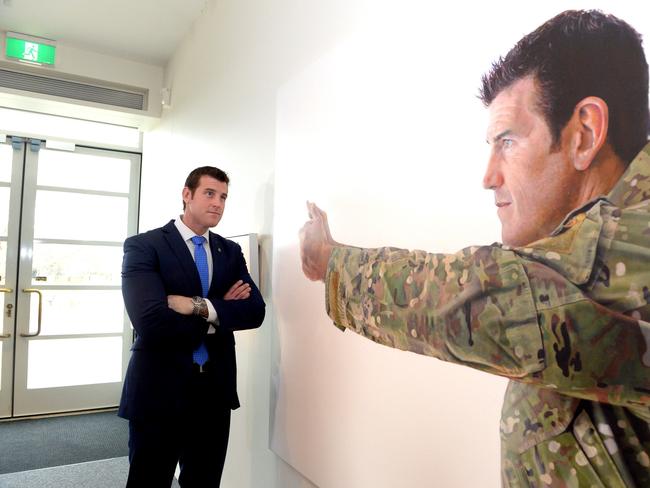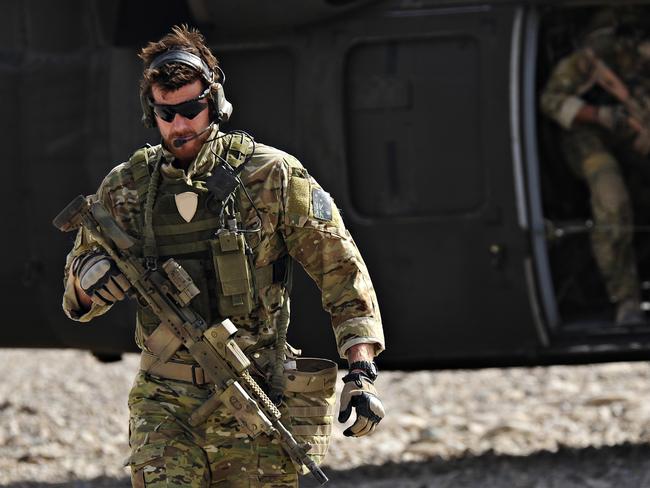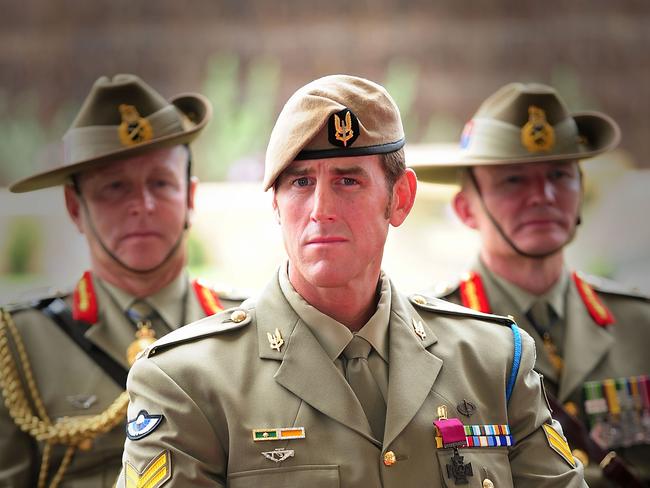Ben Roberts-Smith: crucial Afghan witnesses may be barred from entering Australia to testify in defamation case: court
A fiery court stoush between decorated soldier Ben Roberts-Smith and newspapers seeking to prove he is a war criminal has revealed a serious issue.

Afghan villagers who claim they saw Ben Roberts-Smith kick a handcuffed man off a small cliff may be barred from entering Australia to testify in an upcoming defamation case between the decorated soldier and media outlets.
Three months out from the trial’s scheduled start date, Nine newspapers have asked the Federal Court to allow four crucial witnesses to testify over audiovisual link (AVL) from the conference room of a large law firm in Afghanistan.
But the application was stridently opposed by lawyers for Mr Roberts-Smith, who described the situation as “shambolic” during a hearing on Friday.
The spirited pre-trial clash revealed behind-the-scenes approaches to the Department of Foreign Affairs and Trade (DFAT) — including an email between lawyers, read out by barrister Arthur Moses, asking if they could “grease the wheels” — in a bid to get the witnesses to an Australian embassy in Kabul or Dubai to deliver their testimony.

Mr Roberts-Smith is suing The Sydney Morning Herald, The Age and The Canberra Times over investigative reports he claims falsely painted him as a murderous war criminal during his time as a Special Air Service soldier in Afghanistan between 2009 and 2012.
The Victoria Cross recipient strongly denies any wrongdoing.
Among the allegations levelled at Mr Roberts-Smith by the newspapers is that he kicked a handcuffed Afghan man, Ali Jan, off of a small cliff before Mr Jan was shot dead in Darwan, Uruzgan province, in 2012.
Nine barrister Lyndelle Barnett said the four villagers were “important witnesses” as she sought to convince Justice Anthony Besanko to allow them to testify over AVL.
“Three of the witnesses will give evidence that they saw (Mr Roberts-Smith) kick Ali Jan off a small cliff, and the other will give evidence about the surrounding circumstances of Ali Jan’s custody,” she said.
But Ms Barnett said securing visas for residents of a “high risk” country with a high rate of refugee lodgements in the middle of a global pandemic has proved extremely difficult.
Three of the four have obtained passports and identity documents but it is unlikely they will be granted a visa, the court heard.
A fourth witness, a woman, has no identity documents whatsoever and does not have a surname, Ms Barnett said.
Ms Barnett said the newspapers were still trying to get the witnesses to Australia in time for the trial, but the application was based on their “pessimism” that it would ever happen.
She also asked the court for another person, a soldier currently serving overseas, to be permitted to give his, more limited, evidence over AVL.

Barrister Arthur Moses, acting for Mr Roberts-Smith, blasted Ms Barnett’s argument and said the situation would be “laughable” were it not so grave.
The lawyer cited multiple issues in his enthusiastic rebuttal of Ms Barnett’s argument, including an alleged delay in filing the application, the problems with establishing a secure connection in a trial involving national security information, and the unsuitability of a “suburban law firm” as a venue for taking evidence.
He said an email in March 2020 noted DFAT was “not bullish” about the prospect of the witnesses testifying from the Australian embassy in Kabul.
Yet, Mr Moses said, the matter was not addressed for “months and months”, comparing the situation to Samuel Beckett’s iconic tragicomedy.
“It’s like Waiting For Godot, your honour, for the AVL application to be filed.”
Mr Moses said he would not be “hamstrung” in his cross-examination of the witnesses and would go “hunting” for information about their contact with the newspapers.
“Where did they get them from? What did they show them?” he said.

The issues in the defamation case overlap with the Australian Defence Force inquiry into war crimes released last year, as well as a federal police investigation into Mr Roberts-Smith, the Federal Court has previously heard.
The highly-anticipated trial is expected to traverse a large amount of national security information.
The Commonwealth sought orders on Friday that members of the public and the media sit in a different room where an audiovisual link to the hearing can be turned on, off or restricted to audio only to allow for court closures and anonymous witnesses.
As well, court transcribers will need to undergo security clearances, the Federal Court heard on Friday.
A lawyer representing the Commonwealth will be present for the duration of the evidence.
The hearing is scheduled to begin on June 7.
Justice Besanko has reserved his decision on the AVL application.


